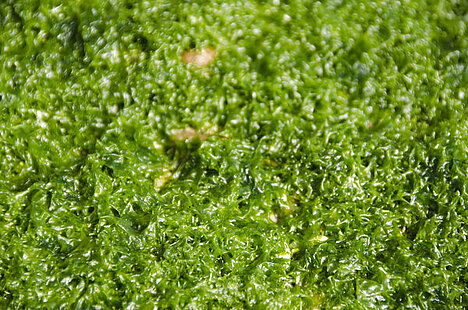Seaweed

What are seaweeds?
Seaweed, also known as knotted seaweed or Ascophyllum nodosum, is a type of brown algae that grows on the coasts of the North Atlantic and North Pacific. They have a brown to green color and form long, branched strands that are thickened at nodes. Seaweed has been used by humans for centuries as food, fertilizer and medicine.
Seaweed contains many valuable ingredients, such as
- Iodine: Iodine is an essential trace element that is required for the formation of thyroid hormones. These hormones regulate the body's metabolism, growth and development. Iodine deficiency can lead to goitre, growth disorders or mental retardation.
- Minerals: Seaweed provides important minerals such as calcium, magnesium, iron, zinc and selenium. These are important for bones, teeth, muscles, nerves and the immune system, among other things.
- Vitamins: Seaweed contains various vitamins, especially from the B complex. These are important for energy production, nerve function and blood formation.
- Dietary fiber: Seaweed has a high proportion of soluble and insoluble dietary fiber. These promote digestion, bind harmful substances and make you feel fuller for longer.
- Antioxidants: Seaweed has a high antioxidant capacity. This means that they can intercept free radicals and thus prevent or reduce cell damage. Free radicals are caused by stress, environmental pollution or ageing processes and can lead to inflammation or disease.
How do seaweed work in dogs?
Seaweed can provide many health benefits for dogs as a dietary supplement. The most important are
- Coat care: Seaweed can make your dog's coat shiny and smooth. They can also promote pigmentation of the coat, nose and paws. This is due to the high content of iodine and other trace elements.
- Tartar prophylaxis: Seaweed can reduce or prevent the formation of tartar in dogs. This is because they stimulate saliva production and thus support the natural cleaning of the teeth. They can also inhibit the growth of bacteria in the mouth.
- Immune system: Seaweed can strengthen your dog's immune system and make it more resistant to illness. This is due to the high content of antioxidants and vitamins.
- Allergies: Seaweed can help dogs with allergies by reducing inflammatory reactions in the body. This is due to the high content of omega-3 fatty acids and other anti-inflammatory substances.
- Thyroid function: Seaweed can help dogs with hypothyroidism by meeting iodine requirements and thus stimulating hormone production. This can lead to an improvement in symptoms such as tiredness, weight gain or hair loss.
What are the disadvantages of seaweed for dogs?
While seaweed is a valuable dietary supplement for dogs, it also has some disadvantages that you should be aware of. The main ones are:
- Excess iodine: seaweed contains a lot of iodine, which can lead to hyperthyroidism if taken in excess. This can lead to symptoms such as restlessness, weight loss or palpitations. Excess iodine can also impair the effect of thyroid medication. If your dog already suffers from a thyroid problem, you should therefore speak to your vet before feeding him seaweed.
- Fluctuations in quality: Seaweed is a natural product that can vary in quality depending on its origin, harvest time and processing. This applies in particular to the iodine content, which can vary greatly. Seaweed can also absorb heavy metals or other harmful substances from seawater. You should therefore only buy high-quality seaweed from trustworthy manufacturers and follow the feeding recommendations on the packaging.
- Incompatibilities: Seaweed can cause intolerances in some dogs, such as diarrhea, flatulence or vomiting. This is because they are difficult to digest and can change the intestinal flora. You should therefore increase the amount of seaweed slowly and observe how your dog reacts to it.
Seaweed is a useful dietary supplement for dogs that can provide them with many health benefits. They can nourish the coat, protect the teeth, strengthen the immune system, alleviate allergies and support thyroid function. However, you should also be aware of the disadvantages of seaweed for dogs, such as excess iodine, variations in quality and intolerances. If you want to feed your dog seaweed, you should follow the feeding recommendations and observe your dog's reaction.
If you notice any signs of hypersensitivity or poisoning in your dog, you should see your vet immediately. We are not a substitute for a vet, but we try to be as accurate as possible. Every dog reacts differently and we recommend you get a second opinion or consult your vet if in doubt.
Stay healthy and take good care of your four-legged friend!😊